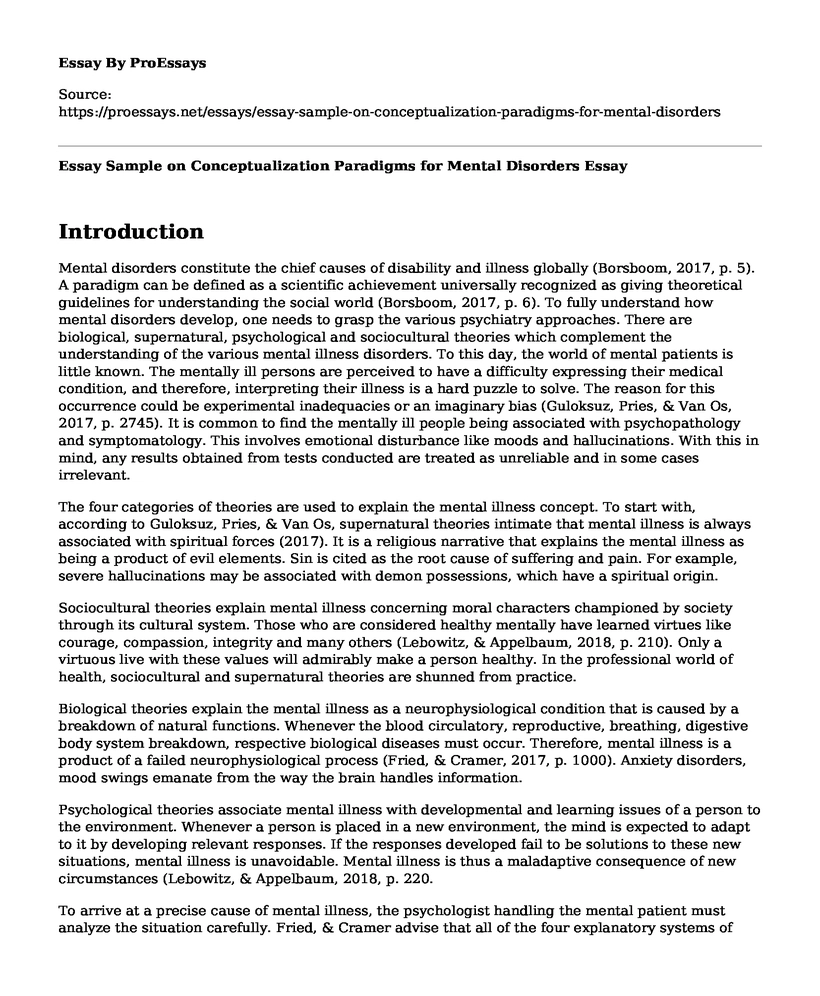Introduction
Mental disorders constitute the chief causes of disability and illness globally (Borsboom, 2017, p. 5). A paradigm can be defined as a scientific achievement universally recognized as giving theoretical guidelines for understanding the social world (Borsboom, 2017, p. 6). To fully understand how mental disorders develop, one needs to grasp the various psychiatry approaches. There are biological, supernatural, psychological and sociocultural theories which complement the understanding of the various mental illness disorders. To this day, the world of mental patients is little known. The mentally ill persons are perceived to have a difficulty expressing their medical condition, and therefore, interpreting their illness is a hard puzzle to solve. The reason for this occurrence could be experimental inadequacies or an imaginary bias (Guloksuz, Pries, & Van Os, 2017, p. 2745). It is common to find the mentally ill people being associated with psychopathology and symptomatology. This involves emotional disturbance like moods and hallucinations. With this in mind, any results obtained from tests conducted are treated as unreliable and in some cases irrelevant.
The four categories of theories are used to explain the mental illness concept. To start with, according to Guloksuz, Pries, & Van Os, supernatural theories intimate that mental illness is always associated with spiritual forces (2017). It is a religious narrative that explains the mental illness as being a product of evil elements. Sin is cited as the root cause of suffering and pain. For example, severe hallucinations may be associated with demon possessions, which have a spiritual origin.
Sociocultural theories explain mental illness concerning moral characters championed by society through its cultural system. Those who are considered healthy mentally have learned virtues like courage, compassion, integrity and many others (Lebowitz, & Appelbaum, 2018, p. 210). Only a virtuous live with these values will admirably make a person healthy. In the professional world of health, sociocultural and supernatural theories are shunned from practice.
Biological theories explain the mental illness as a neurophysiological condition that is caused by a breakdown of natural functions. Whenever the blood circulatory, reproductive, breathing, digestive body system breakdown, respective biological diseases must occur. Therefore, mental illness is a product of a failed neurophysiological process (Fried, & Cramer, 2017, p. 1000). Anxiety disorders, mood swings emanate from the way the brain handles information.
Psychological theories associate mental illness with developmental and learning issues of a person to the environment. Whenever a person is placed in a new environment, the mind is expected to adapt to it by developing relevant responses. If the responses developed fail to be solutions to these new situations, mental illness is unavoidable. Mental illness is thus a maladaptive consequence of new circumstances (Lebowitz, & Appelbaum, 2018, p. 220.
To arrive at a precise cause of mental illness, the psychologist handling the mental patient must analyze the situation carefully. Fried, & Cramer advise that all of the four explanatory systems of theories could serve well in establishing the cause of the ill-health (2017). Professionally, only the two will be tabled as being relevant-the biological and psychological theories. When people fail to adapt accordingly to their new environment and process information as they should, they are likely to exhibit some level of mental illness. Relevant counseling will be offered to such to reinstate the mental condition to the normal state.
Conclusion
Mood disorders are a pool of disorders related to depression. There are several types of mood disorders, e.g. dysthymia (prolonged depression which is irritable), major depression (hopelessness lasting for more than a fortnight), substance-induced mood disorder and those arising from other health conditions (Lebowitz, & Appelbaum, 2018, p. 216). Mood disorders are treated using either psychotherapy or antidepressants. The therapies are geared towards changing the way someone views their environment.
References
Borsboom, D. (2017). A network theory of mental disorders. World Psychiatry, 16(1), 5-13.
Fried, E. I., & Cramer, A. O. (2017). Moving forward: challenges and directions for psychopathological network theory and methodology. Perspectives on Psychological Science, 12(6), 999-1020.
Guloksuz, S., Pries, L. K., & Van Os, J. (2017). Application of network methods for understanding mental disorders: pitfalls and promise. Psychological medicine, 47(16), 2743-2752.
Lebowitz, M. S., & Appelbaum, P. S. (2018). Biomedical Explanations of Psychopathology and Their Implications for Attitudes and Beliefs About Mental Disorders. Annual review of clinical psychology.
Cite this page
Essay Sample on Conceptualization Paradigms for Mental Disorders. (2022, Nov 14). Retrieved from https://proessays.net/essays/essay-sample-on-conceptualization-paradigms-for-mental-disorders
If you are the original author of this essay and no longer wish to have it published on the ProEssays website, please click below to request its removal:
- Counseling for Multiculturalism and Social Justice Reflection Paper
- Essay Sample on Human Memory Distortions: Challenges in Daily Activities
- Counselor Self-Care: Key to Optimum Mental & Physical Health - Essay Sample
- Essay on Prosperity via Fictitious or Honest Means: Reality Life's Unconditional Wedge
- Free Paper on Family Dynamics: Understanding Bowen's Theory of Emotional Interdependence
- Report Example on Neuroscience & Psychotherapy
- Genes Affect Cognitive Processes - Essay Example







